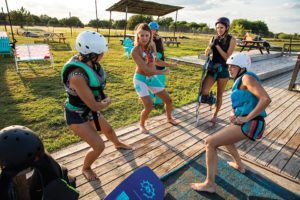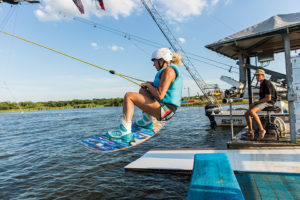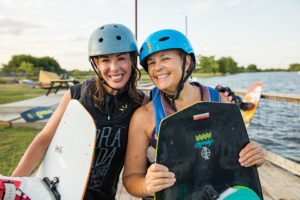Women Wakeboarders of Austin

Three or four women stand on the dock…or rest on benches nearby, boards in hand, waiting for three or four more to swing by at 19, 20 mph, ropes in hands, knees bent as they prepare to attempt a back-five or a 360 off a ramp.
As they do, the women on the dock cheer and chant encouragements as their comrades land perfect tantrums or skim across the water for the very first time. And on the launch pad, a click so soft you might miss it if you weren’t paying attention, announces the catch of another rope, and with it, one more determined woman launches onto the lake.
These are the women wakeboarders of Austin, the female shredders, and they turn up for the sport and for each other — a family, a community of athletes supporting one another. At Austin’s cable parks, the women who love the sport are banding together to support each other, learn from one another and simply spend time together in, on or near the water, rope in hand, feet in bindings.
They do it because water sports like wakeboarding are frequently dominated by men, especially where competition is concerned, and they want to remedy that by showing women and girls that this sport is for them, too.

Many of these confident women didn’t have that experience when they got started. For some, there was a struggle of insecurity when they looked up and saw a sport lacking in female presence. Questions arose: Was it a sport in which they were capable of excelling? Was there a place for them in it?
“‘Is this even something girls can do?’” wakeboarder Valerie Masterman questioned when she first started riding with her brother five years ago.
“It was scary,” she says.
The sense of empowerment was always present — embodied in experienced female athletes encouraging the next generation — but that empowerment wasn’t evident in the numbers. For one, prize money for women who make podium in competition is typically less than that of their male counterparts. And the women’s division of some competitive circuits is lacking. But for those who just participate in the sport for fun, it’s often about a much simpler number — It seems like there are far fewer women involved than men, and that can be a daunting realization.
“It’s hard for a woman to get into a male-dominated sport,” says Masterman. “It helps to have another girl cheering you on.”
Which is why she joined — and is now board captain of — the local Babe Shredder chapter, a radical community of rebel females who tear it up on a board, whether it’s on the water, pavement or snow. The organization is about promoting women in all board sports, including wakeboarding. It’s an inclusive, respectful atmosphere that aims to bolster women’s confidence and encourage them to laugh in the face of new challenges.
“It’s a very female-positive group,” Masterman says. “Everyone has a similar mentality of cheering each other on.”
And for many women, encouragement is all they really need.
Masterman found her place when she stumbled upon the Babe Shredder community at Quest, a cable park in Austin. This community has helped her and others work through fear of being too weak or incapable of wakeboarding, or being the only ones with dreams of shredding it on the water.

Ashley Tabor also found support in the community when she started wakeboarding — and competing — five years ago. With their encouragement and support, Tabor now travels around the country competing and feels that same love and support wherever she rides.
“No matter where you go, girls are supportive,” Tabor says.
Women from the Texas A&M Wake Team often join in on ladies’ nights at local cable parks to commune with other like-minded women. Others, like Jen Baker, just ride for the love of the sport and the camaraderie it offers.
“It’s just a really good environment,” Baker says.
It certainly helps that Austin offers plenty of places to wakeboard. Also, each of the three cable parks near the city offers a special Ladies’ Night where women — official Babe Shredders or not — can show up and ride at a discount.
Texas Ski Ranch plays host on Monday nights where ladies can wakeboard for free if they have their own equipment (or they can also rent from the park). Next Level Ride in East Austin offers $20 deals to ladies on Wednesdays, and Quest in Southeast Austin invites women to strap in for $15 on Tuesdays.
“Wakeboarding is an intimidating sport,” says Niki Sotkovski, co-owner of Next Level Ride. “It’s easier when you’re surrounded by supportive women. I wanted to give girls the opportunity to come ride together.”
Men are welcome, however they might be required to don a dress — for solidarity.

It also is a fun way to amplify the message: women wakeboarders are supported in Austin, which is made even more apparent in competition. Every wakeboard event in Austin hosts a women’s division, which isn’t always the case in every city.
But the community is not all about competition and pushing each other to improve — it’s about friendship. After ladies’ nights and a few dozen laps around the lake, anywhere between 5-20 women hover around picnic tables, sharing snacks, drinks and stories.
In the off-season, they go rock climbing together or axe-throwing or take yoga classes, continuing the camaraderie throughout the year, which cements the community and the support system they’re trying to build.
“We live in a time when women are supporting women,” says Baker, who rides at Next Level Ride on a near weekly basis. “I feel like Austin has a really good group of women who support each other.”
They’re also out there shredding for the future so the next generation of girls growing up in the sport have the confidence to get out there and ride. Summer camps at Quest this year were a girl majority — a first for the park. Also, more women than ever participated in the annual Points Chase competitions this summer across the parks. Milestones like these are creating unparalleled excitement for the future of the sport for females.
But in the meantime, they’ll continue to ride, inviting other strong women to join them — advocating for their community of competitive wakeboarders, athletes with dreams of going pro, women just in it for the thrill of the sport and those who are just starting to learn as they slide into their bindings and clutch the rope for the very first time. It’s a community, a sisterhood and a strong group of athletes, period.
“It’s straight-up girl power,” Sotkovski says. “These babes rock.”






